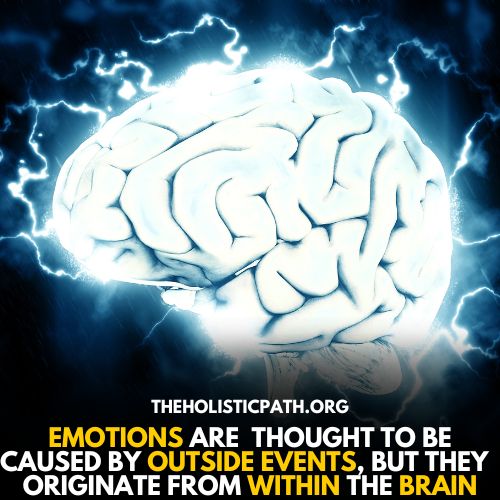Emotions are strange and mysterious things. They can be overwhelming and all-consuming, or they can be subtle and hard to pin down. But where do emotions come from? Some people believe that emotions are entirely automatic, based on our physiology and past experiences.
Others believe that we have more control over our emotions and that we can choose how to respond to them. However, the truth is likely somewhere in between. In this article, we’ll take a closer look at where emotions come from, and how we can better understand and control them.
What Are Emotions And Why Do We Need Them
Emotions are our physical and mental responses to the things that happen to us. When we see, hear, smell, taste, or feel something, our brains automatically generate an emotional response. This response is a mix of our thoughts, beliefs, and past experiences, as well as our physical reactions. For example, if you see a snake in your path, you might feel afraid.
Your heart rate will increase and you might start to sweat. These physical reactions are your body’s way of preparing you to fight or flee from the perceived danger. Emotions can be positive or negative, and they can range from mild to intense.
Some common emotions include happiness, sadness, anger, fear, love, and jealousy. While we all experience emotions differently, they serve an important purpose in our lives. They help us to connect with other people, express ourselves, and navigate the world around us.
Where Do Emotions Come From: The Brain
Emotions are often thought of as being caused by outside events, but they actually originate from within the brain. The limbic system, which is located in the center of the brain, is responsible for processing emotions. This system includes the hippocampus, which is important for forming memories, and the amygdala, which is involved in fear and other emotions.
When something happens that triggers an emotional response, electrical signals are sent from the limbic system to the rest of the brain. These signals cause physical changes, such as increased heart rate and sweating, as well as psychological changes, such as feelings of happiness or sadness.

Emotions also play a role in decision-making, as they can help us to quickly assess a situation and decide how to respond. Ultimately, emotions are a crucial part of what makes us human.
Different parts of the brain give rise to different emotions. Some of the common emotions are:
Fear:
When we experience fear, it’s thanks to the amygdala, a small almond-shaped structure deep in the brain. The amygdala is part of the limbic system, which is responsible for processing emotions like fear, anger, and pleasure. When we encounter a potential threat, the amygdala sends out a “danger” signal to the rest of the brain.
This triggers a release of adrenaline and cortisol, which gets us revved up and ready to face the danger head-on. In other words, fear is our body’s way of telling us that we’re in danger and need to take action.
So next time you’re feeling afraid, remember that it’s all thanks to your amygdala!
Happiness:
When we experience positive emotions like happiness, it’s thought that the hippocampus helps to encode these memories so that we can recall them later. Additionally, the hippocampus is also involved in the release of neurotransmitters like dopamine, which are associated with feelings of pleasure and happiness.
So, while there’s no one “happiness center” in the brain, the limbic system – and specifically the hippocampus – plays an important role in our emotional well-being.
Anger:
When we get angry, it’s because the limbic system has been activated. This can happen in response to a real or perceived threat. The exact physiologic response depends on the individual, but it usually involves an increase in heart rate, blood pressure, and respiration. The amygdala is especially important in the experience of anger.
This small, almond-shaped structure is involved in processing emotions like fear, anxiety, and aggression. It’s believed that the amygdala plays a key role in triggering the fight-or-flight response. So when we get angry, it’s because our amygdala has been activated and we’re getting ready to fight or take flight!
Sadness:
Research has shown that the hippocampus is especially important in processing negative emotions like sadness. When we experience something sad, the hippocampus helps to encode that memory in a way that makes us feel the emotion more deeply.
In other words, it’s the part of the brain that makes us feel really sad when we think about something that was upsetting in the past. So if you’re feeling blue, it may be because your hippocampus is working overtime!
Guilt:
Guilt is a complex emotion that is often caused by conflicting thoughts and feelings. On one hand, you may feel guilty for not doing something that you should have done. On the other hand, you may feel guilty for doing something that you shouldn’t have done. But what exactly is guilt? And what part of the brain is responsible for us feeling it?

According to recent studies, guilt is associated with activity in the prefrontal cortex, which is the part of the brain responsible for executive functions like planning, decision-making, and impulse control. This makes sense when you think about it; after all, guilt is often caused by our failure to live up to our own standards or expectations.
When we make a mistake, our prefrontal cortex helps us to see the consequences of our actions and understand why we feel guilty.
Role of Environment, Genetics, And Life Experiences In Shaping Emotions
Emotions are a complex response to the environment, influenced by factors such as genetics and life experiences.
- Environment: The environment can trigger emotions in several ways. For example, seeing a loved one after a long absence may stimulate the emotion of happiness. Alternatively, being in a place where you have experienced a traumatic event may trigger fear or anxiety.
- Genetics: There is evidence that some people are born with a predisposition to certain emotions. For example, studies on twins suggest that there is a genetic component to happiness. However, it is important to note that genes are only one factor in shaping emotions; life experiences also play a role.
- Life experiences: Life experiences play a significant role in shaping emotions. For example, if you have had positive experiences with dogs, you are likely to feel happy when you see one. However, if you have been bitten by a dog, you may feel fear or anxiety when you see one. In conclusion, emotions are shaped by environment, genetics, and life experiences.
The Science Of Emotions
Emotions are a natural part of life. They are our conscious experience of feeling states, often associated with particular behaviors. We all have emotions, and they play an important role in our lives. Most of us can think of a time when we felt particularly happy or sad, frightened or angry.
There is still much to learn about emotions, but scientists have identified some of the ways that they might be generated. One theory suggests that emotions are created by our interactions with the world around us. Another possibility is that they originate from within the brain itself. It is likely that both of these things are true to some extent.
Theory 1: Emotions Are Caused By Physical Sensations
Where do emotions come from? This theory suggests that emotions are caused by changes in our body, such as an increase in heart rate or a change in facial expression.
For example, you might feel happy because you’re smiling, or you might feel angry because your heart is pounding. This theory also suggests that we can’t have an emotion without first experiencing a physical sensation.
So, if you’re not feeling any physical changes, then you’re not really feeling an emotion. While this theory does provide a simple explanation for where emotions come from, it doesn’t quite hold up to scientific scrutiny. For one thing, it’s often hard to say exactly what physical sensations are responsible for which emotions.
Additionally, there are many cases where we experience emotions without any corresponding changes in our bodies. So, while this theory may provide a helpful starting point, it’s far from being the final word on the subject.
Theory 2: Emotions Are Caused By Our Thoughts
Emotions come from our thoughts, what we believe, and our interpretation of events. If we believe something bad is going to happen, we’re likely to interpret events in a way that supports that belief. For example, if I think my boss is going to fire me, I’m likely to interpret they’re asking me to come into their office as a sign that my job is in jeopardy.

Even if that’s not what they’re actually planning to talk about. Our thoughts also come from the messages we’ve internalized from the people around us. If we’ve been told our whole lives that we’re not good enough, it’s likely that we’ll believe it.
And that belief will shape the thoughts we have about ourselves. So, where do our beliefs come from? They come from our past experiences and the messages we’ve received from others. All of this impacts the way we interpret events and, as a result, how we feel.
Theory 3: Emotions Are Caused By Both Physical Sensations And Thoughts
Where do emotions come from? Some scientists believe that emotions are caused by physical sensations, while others believe that thoughts play a role as well. The third theory is that emotions are caused by both physical sensations and thoughts.
This theory is supported by the fact that people can feel emotions in different parts of their bodies, and that these emotions can be influenced by what they are thinking about. For example, if someone is thinking about a happy memory, they may start to feel happy themselves. Similarly, if someone is thinking about something that makes them anxious, they may start to feel anxious as well.
Ultimately, the source of our emotions is complex and multi-faceted. While we may not always be aware of it, our thoughts and physical sensations work together to create our emotional experience.
The Role Of Hormones In Emotional Responses
We all know that hormones can have a big impact on our bodies – from puberty to pregnancy, they can cause all sorts of changes. But did you know that hormones can also affect our emotions?
It’s true! Different hormones are responsible for different emotions, and when our levels of these hormones get out of balance, it can lead to some pretty intense feelings. For example, the hormone cortisol is sometimes called the “stress hormone” because it’s released in response to stress and helps us to deal with it.
However, if we’re constantly stressed, our cortisol levels can become too high, which can lead to anxiety and even depression. Similarly, the hormone oxytocin is sometimes called the “love hormone” because it’s involved in bonding and attachment. Oxytocin levels are thought to influence how trusting and social we are, and low levels have been linked to autism.
So next time you’re feeling a bit off, it might be worth considering whether your hormones are out of balance!
How Do Emotions Affect Our Daily Lives?
Our emotions play a big role in our day-to-day lives, influencing everything from the food we eat to the way we interact with others. Here are some ways that emotions can affect our lives:
- Emotions can affect our eating habits. When we’re feeling stressed or down, we may be more likely to turn to comfort foods. On the other hand, when we’re feeling happy and content, we may be less likely to crave unhealthy foods.
- Emotions can affect our sleep patterns. When we’re stressed or anxious, we may have trouble falling asleep. Alternatively, when we’re feeling happy and relaxed, we may find it easier to drift off.
- Emotions can affect our social lives. When we’re feeling positive emotions like happiness and love, we may be more likely to reach out to others and form meaningful relationships. However, when we’re feeling negative emotions like sadness and anger, we may be more likely to withdraw from others and isolate ourselves.
- Emotions can affect our work performance. When we’re feeling motivated and inspired, we may be more productive at work. However, when we’re feeling de-motivated and uninterested, our work performance may suffer.

As you can see, emotions can have a big impact on our lives. It’s important to be aware of how our emotions are affecting us so that we can make choices that are in line with our goals and values.
Benefits Of Understanding Emotions
Most of us go through life without giving much thought to our emotions. We tend to just react to whatever comes our way, good or bad. But what if we stopped to consider our emotions more carefully? What are the benefits of understanding our emotions?
Here are a few benefits of understanding our emotions:
- We can become more self-aware. When we understand our emotions, we can become more aware of how they affect us both physically and mentally. This can help us to be more in control of our reactions and make better choices in how we respond to situations.
- We can build better relationships. When we understand our emotions, we can communicate them more effectively to others. This can lead to deeper, more meaningful relationships built on trust and understanding.
- We can manage stress better. When we understand our emotions, we can learn to recognize when we are starting to feel overwhelmed or stressed. This knowledge can help us to take steps to reduce or prevent stress before it gets out of hand.
Understanding our emotions is important because it helps us to control them, manage them better, communicate better, and be more successful. So next time take a moment to stop and consider what that emotion is trying to tell you. You may be surprised at what you learn about yourself!
Learn To Better Understand Emotions
There’s no question that emotions can be complex and difficult to understand. However, there are a few things we can do to learn to better understand our emotions. Here are a few suggestions:
- Take some time each day to check in with your emotions. How are you feeling? What might be causing those feelings?
- Talk to somebody who understands emotions: This could be a friend, family member, therapist, or anybody else to who you feel comfortable talking about your feelings. Talking openly and honestly about how we’re feeling can be very helpful in gaining insight into our emotions.
- Think about why we’re feeling the way we’re feeling: When we’re able to identify the root cause of our emotions, it can be much easier to understand them. Sometimes, our emotions can be caused by something that happened in the past, or they may be related to a current situation. Taking some time to think about why we’re feeling a certain way can help us to better understand our emotions.
- Keep a journal: Writing down our thoughts and feelings can be very helpful in understanding our emotions. Seeing our thoughts and feelings written out on paper can sometimes help us to see things from a different perspective and gain new insight into our emotions.
5 Techniques That Can Help When Feeling Overwhelmed By Emotions
It’s normal to feel overwhelmed by our emotions from time to time. Life is full of ups and downs, and sometimes it can be hard to cope with everything that’s going on. However, there are some techniques that can help us to manage our emotions and feel more in control.

Some things that might help include:
- Talk to someone about how you’re feeling. It can be really helpful to share your experiences with someone who will understand and support you.
- Identify your triggers. If there are certain things that tend to make your emotions feel out of control, try to avoid them or be prepared for them.
- Practice mindfulness. Mindfulness can help us to stay in the present moment and focus on our breath instead of getting caught up in our thoughts.
- Exercise. Exercise releases endorphins, which have mood-boosting effects. Just a few minutes of exercise can make a big difference.
- Connect with nature. Spending time in nature can help us to feel calmer and more grounded.
Try out different techniques and see what works for you. It might take some time to find something that really helps, but it’s worth the effort. When we’re able to manage our emotions better, we’re able to enjoy our lives more fully.
Conclusion
Emotions are complex and difficult to study. Scientists have only recently begun to understand where they come from. It is clear that emotions are generated by the limbic system, which is responsible for basic survival functions like eating and drinking.
However, the exact mechanisms by which emotions are generated are still not fully understood. It is clear that emotions serve an important purpose in our lives, helping us to navigate the world and interact with others. As our understanding of emotions evolves, we will be better able to control them and use them to our advantage.
